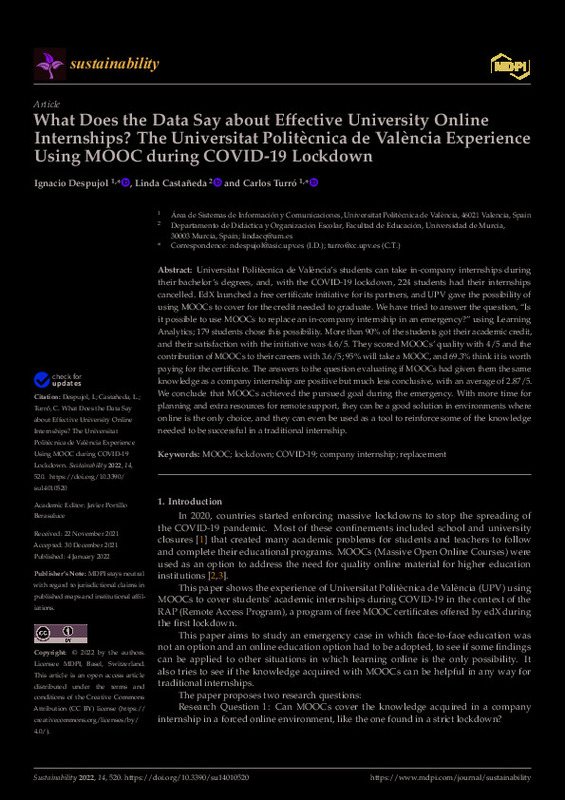JavaScript is disabled for your browser. Some features of this site may not work without it.
Buscar en RiuNet
Listar
Mi cuenta
Estadísticas
Ayuda RiuNet
Admin. UPV
What Does the Data Say about Effective University Online Internships? The Universitat Politecnica de Valencia Experience Using MOOC during COVID-19 Lockdown
Mostrar el registro sencillo del ítem
Ficheros en el ítem
| dc.contributor.author | Despujol Zabala, Ignacio
|
es_ES |
| dc.contributor.author | Castañeda, Linda
|
es_ES |
| dc.contributor.author | Turró, Carlos
|
es_ES |
| dc.date.accessioned | 2023-10-24T18:01:47Z | |
| dc.date.available | 2023-10-24T18:01:47Z | |
| dc.date.issued | 2022-01 | es_ES |
| dc.identifier.uri | http://hdl.handle.net/10251/198752 | |
| dc.description.abstract | [EN] Universitat Politecnica de Valencia's students can take in-company internships during their bachelor's degrees, and, with the COVID-19 lockdown, 224 students had their internships cancelled. EdX launched a free certificate initiative for its partners, and UPV gave the possibility of using MOOCs to cover for the credit needed to graduate. We have tried to answer the question, "Is it possible to use MOOCs to replace an in-company internship in an emergency?" using Learning Analytics; 179 students chose this possibility. More than 90% of the students got their academic credit, and their satisfaction with the initiative was 4.6/5. They scored MOOCs' quality with 4/5 and the contribution of MOOCs to their careers with 3.6/5; 95% will take a MOOC, and 69.3% think it is worth paying for the certificate. The answers to the question evaluating if MOOCs had given them the same knowledge as a company internship are positive but much less conclusive, with an average of 2.87/5. We conclude that MOOCs achieved the pursued goal during the emergency. With more time for planning and extra resources for remote support, they can be a good solution in environments where online is the only choice, and they can even be used as a tool to reinforce some of the knowledge needed to be successful in a traditional internship. | es_ES |
| dc.description.sponsorship | This research has been partially supported by the project & ldquo;Competencies for Universities & mdash;using Technology in Education & rdquo; CUTE, an ERASMUS+ Strategic Partnership (KA203-867FE04B), funded by the European Union. | es_ES |
| dc.language | Inglés | es_ES |
| dc.publisher | MDPI AG | es_ES |
| dc.relation.ispartof | Sustainability | es_ES |
| dc.rights | Reconocimiento (by) | es_ES |
| dc.subject | MOOC | es_ES |
| dc.subject | Lockdown | es_ES |
| dc.subject | COVID-19 | es_ES |
| dc.subject | Company internship | es_ES |
| dc.subject | Replacement | es_ES |
| dc.subject.classification | INGENIERIA DE LA CONSTRUCCION | es_ES |
| dc.title | What Does the Data Say about Effective University Online Internships? The Universitat Politecnica de Valencia Experience Using MOOC during COVID-19 Lockdown | es_ES |
| dc.type | Artículo | es_ES |
| dc.identifier.doi | 10.3390/su14010520 | es_ES |
| dc.relation.projectID | info:eu-repo/grantAgreement/EC//KA203-867FE04B//Competencies for Universities using Technology in Education (CUTE)/ | es_ES |
| dc.rights.accessRights | Abierto | es_ES |
| dc.contributor.affiliation | Universitat Politècnica de València. Escuela Técnica Superior de Ingeniería del Diseño - Escola Tècnica Superior d'Enginyeria del Disseny | es_ES |
| dc.description.bibliographicCitation | Despujol Zabala, I.; Castañeda, L.; Turró, C. (2022). What Does the Data Say about Effective University Online Internships? The Universitat Politecnica de Valencia Experience Using MOOC during COVID-19 Lockdown. Sustainability. 14(1):1-12. https://doi.org/10.3390/su14010520 | es_ES |
| dc.description.accrualMethod | S | es_ES |
| dc.relation.publisherversion | https://doi.org/10.3390/su14010520 | es_ES |
| dc.description.upvformatpinicio | 1 | es_ES |
| dc.description.upvformatpfin | 12 | es_ES |
| dc.type.version | info:eu-repo/semantics/publishedVersion | es_ES |
| dc.description.volume | 14 | es_ES |
| dc.description.issue | 1 | es_ES |
| dc.identifier.eissn | 2071-1050 | es_ES |
| dc.relation.pasarela | S\453477 | es_ES |
| dc.contributor.funder | European Commission | es_ES |
| dc.contributor.funder | Universitat Politècnica de València | es_ES |
| upv.costeAPC | 982 | es_ES |








